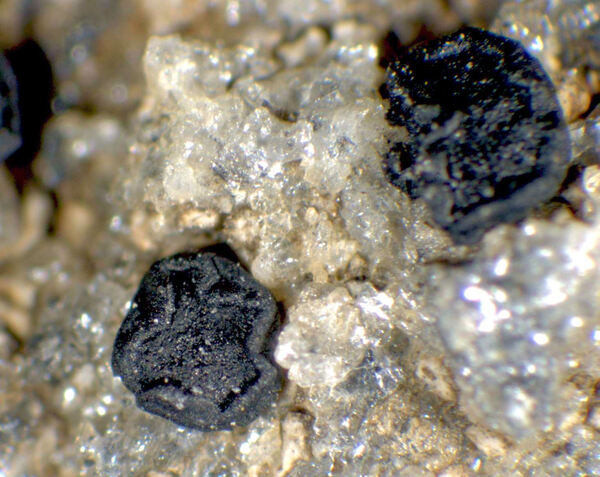Lecidea auriculata Th. Fr. subsp. auriculata
N. Acta Reg. Soc. Sci. Upsal., ser. 3, 3: 213, 1861.
Synonyms: Lecidea auriculata subsp. auriculata Th. Fr.; Lecidea auriculata var. subinops Vain.; Lecidea bagliettoana Zahlbr.; Lecidea confoederans Nyl.; Lecidea interjecta Bagl. & Carestia non Nyl. nec (Müll. Arg.) Stizenb.
Description: Thallus crustose, endosubstratic and poorly evident to thinly episubstratic and grey-white, rimose-areolate, with or without a dark prothallus. Medulla I+ blue. Apothecia lecideine, black, strongly constricted at base, (0.6-)1-2.5(-4) mm across, with a concave to flat, epruinose or faintly pruinose disc, and a thick, raised, often becoming flexuose, persistent proper margin. Proper exciple 100-150 μm thick, partially extending below the hypothecium, dark brown to violet-brown in outer part, pale brown to pinkish brown within, of intricate-radiating, 2-3 μm thick, thin walled, loosely arranged hyphae, C-; epithecium blue-green to blackish green; hymenium colourless or pale green, 30-40(-50) μm high; paraphyses mostly simple, 1.3-2 µm thick at mid-level, the apical cells 3-4(-5) µm wide, with a dark green cap; hypothecium conspicuous, violet-brown, to 200 µm high. Asci 8-spored, narrowly clavate, thick-walled, with a K/I+ pale blue tholus and a strongly amyloid, thin apical cushion, surrounded by a I+ blue outer layer, Lecidea-type. Ascospores 1-celled, hyaline, narrowly ellipsoid with abruptly truncate ends, (5-)6-11(-12) x (1.5-)2-4 μm, 2.5-4 times as long as wide. Photobiont chlorococcoid. Pycnidia black, immersed. Conidia bacilliform, 10-15 x 0.8-1 μm. Spot tests: thallus K-, C-, KC-, P-, UV-. Chemistry: confluentic acid, glomelliferic acid (trace), 2-0-methylconfluentic acid (trace), 2'-0-methylanziaic acid (trace).
Growth form: Crustose
Substrata: rocks
Photobiont: green algae other than Trentepohlia
Reproductive strategy: mainly sexual
Commonnes-rarity: (info)
Alpine belt: rather rare
Subalpine belt: very rare
Montane belt: absent
Dry submediterranean belt: absent
Humid submediterranean belt: absent
Padanian area: absent
pH of the substrata:
1 2 3 4 5
Solar irradiation:
1 2 3 4 5
Aridity:
1 2 3 4 5
Eutrophication:
1 2 3 4 5
Poleotolerance:
0 1 2 3
Altitudinal distribution:
1 2 3 4 5 6
Rarity
absent
extremely rare
very rare
rare
rather rare
rather common
common
very common
extremely common
Loading data...
Occurrence data
Predictive map
Growth form: Crustose
Substrata: rocks
Photobiont: green algae other than Trentepohlia
Reproductive strategy: mainly sexual
Commonnes-rarity: (info)
Alpine belt: rather rare
Subalpine belt: very rare
Montane belt: absent
Dry submediterranean belt: absent
Humid submediterranean belt: absent
Padanian area: absent
pH of the substrata:
| 1 | 2 | 3 | 4 | 5 |
Solar irradiation:
| 1 | 2 | 3 | 4 | 5 |
Aridity:
| 1 | 2 | 3 | 4 | 5 |
Eutrophication:
| 1 | 2 | 3 | 4 | 5 |
Poleotolerance:
| 0 | 1 | 2 | 3 |
Altitudinal distribution:
| 1 | 2 | 3 | 4 | 5 | 6 |
Rarity
absent
extremely rare
very rare
rare
rather rare
rather common
common
very common
extremely common
Loading data...
Occurrence data
Predictive map









